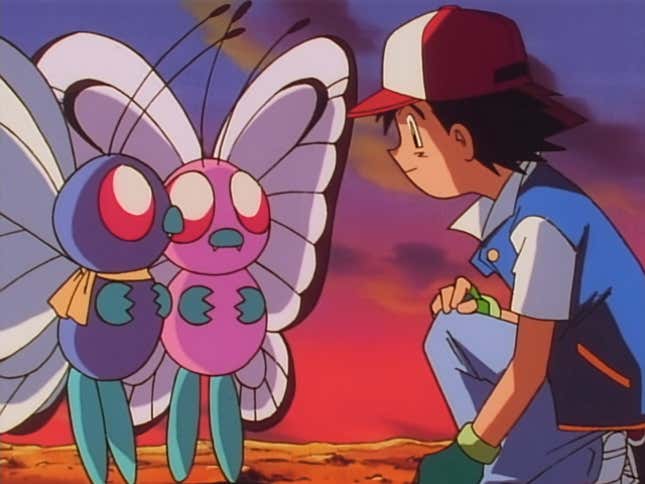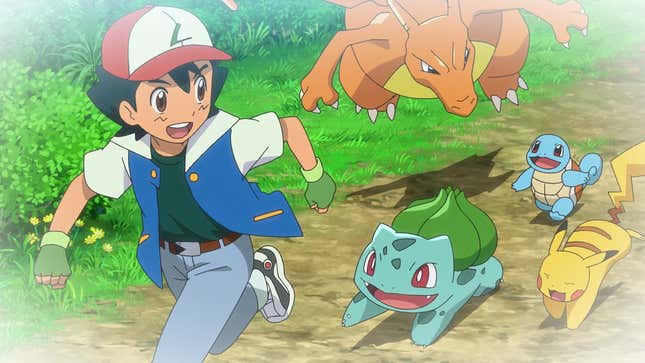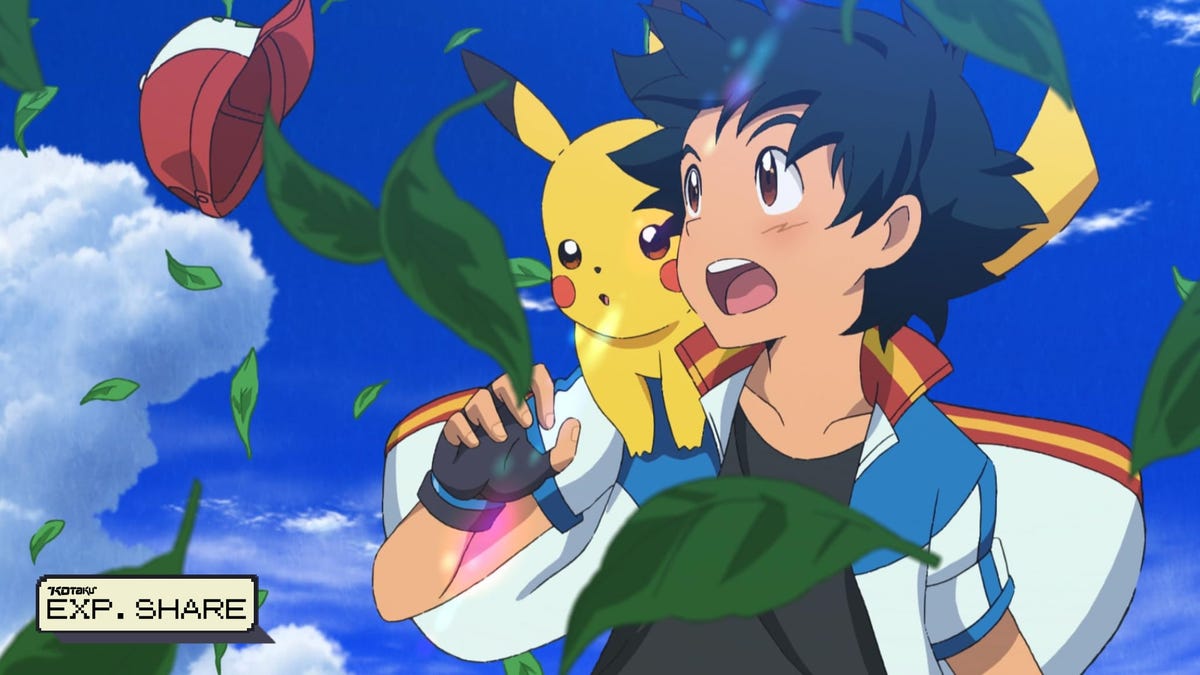On September 8, Ash Ketchum’s final Pokémon episodes will premiere on Netflix. After 25 years and over 1,200 episodes, the anime has retired its long-time protagonist and is moving on to new main characters Liko and Roy as they embark on a journey throughout the Pokémon world. Depending on who you ask, this is either a bittersweet end of an era, or a necessity for the Pokémon TV show to move in new, exciting directions. But regardless of whether or not you think Ash and his quest to be a Pokémon Master should have been kicked to the curb years ago, a pillar of nearly every fan’s Pokémon journey is coming to an end.
For me, Ash was, and largely still is the quintessential anime protagonist from my childhood, beating out characters like Yugi from Yu-Gi-Oh! or Goku from Dragon Ball as the most formative character of my early years. His relationship with his partner Pikachu has embodied friendship and informed my internalized role-playing with my own Pokémon in every single game. But even so, my connection to Pokémon has changed over the years, and my viewership of the anime Ash starred waxed and waned.
Even if I hadn’t watched the show in a bit, I, like many other fans, felt a great sense of pride for the kid from Pallet Town after he became a Pokémon world champion at the end of his final season. But that also probably meant his time was limited. Shortly after, The Pokémon Company confirmed it would be leaving him behind. Even those of us who’ve fallen off the show often still view Ash as central to our own Pokémon journeys, and for a long time, it felt like he would be a fixture for every Pokémon fan, no matter when they started watching the anime.
For long-time fans, Ash’s departure is the end of an era
“I felt unexpectedly emotional when I heard that Ash was finally being retired,” Keza MacDonald of The Guardian (previously of Kotaku) told me. “He seemed like one of those perennial characters, an ageless fixture. If my kids get into Pokémon—and I’ve shown them a few old episodes of the anime, we’ll see how it goes—they’ll be growing up with different aspirational trainers.”
MacDonald echoed a sentiment I felt as a child. When I was growing up adults often talked down to us for loving Pokémon. What they didn’t realize was that it was a power fantasy for kids who felt trapped and beholden to their parents’ rules, and yearned to embark on their own journeys alongside their friends and determine who they wanted to be on their own terms.
“There was an emotional core to Pokémon in the early days that’s still there,” she said. “To adults, it looked like this hyper-commercialized, manufactured phenomenon, designed to sell toys and lunchboxes, but to kids it meant something. Actually, Pokémon is a classic children’s story and Ash is a classic children’s character: the child out on their own, in a world where adults don’t get to call the shots, forming their own relationships and forging their own way.”

Welcome to Exp. Share, Kotaku’s Pokémon column in which we dive deep to explore notable characters, urban legends, communities, and just plain weird quirks from throughout the Pokémon franchise.
Even as Ash and Pikachu haven’t aged in their decades-long run, Pokémon fans have, and that means a lot of people grow out of the show at some point. As such, you can probably reasonably tell how old someone is by asking them what their favorite scenes from the series are. If you talk to a millennial, they’ll probably mention episodes like when Ash released his beloved Butterfree so it could stay with a pink-colored mate. That still sticks, because it was devastating for us as children. Hell, even going back and watching it as an adult, that shit hurts so good. Ash’s story revolves around perseverance, determination, and connection, but equally deals with letting go, facing loss, and picking each other off the ground.

“I think the moment that sticks with me the most is at the end of the Indigo League arc, when he loses,” writer Sam Greszes told Kotaku. “I was a kid when I saw that, but I understood what kid shows looked like. And though Pokémon is by no means the first, only, or even best anime to do this, for me, watching that episode was my first experience watching a protagonist fail at his overarching goal. […] It felt nice. Made me think about what you achieve, learn, and discover along your way to a goal, and how making connections can help you through crushing failures.”
Younger fans often see Ash as a cool adventurer who gets to go on all these incredible journeys around the Pokémon world, or you might view him as an overly optimistic kid with no real flaws, but for adult fans like streamer Josh Vasquez, his selfless optimism and heroics have taken on new, greater meaning. In the X and Y season, there’s an episode called “Lumiose City Pursuit!” in which Ash and Pikachu are trying to subdue an enraged Garchomp, and in the struggle, the little yellow guy is knocked off the Lumiose Tower (think Pokémon’s equivalent of the Eiffel Tower in Paris), and Ash jumps from this height to save his friend.
“[There was] no hesitation,” Vasquez said. “He is of course saved but when he jumped, he didn’t know he would be. He jumped to save his friend thinking he would likely die. Ash has done things like that before but I think at the time being a little older it really hit. I was living on my own and moved to a new state and was still getting used to being away from friends and family. So I think seeing that show of love and friendship really hit home for me in the moment.”
This gradual, rediscovered appreciation for Ash is a trend among adult fans I’ve spoken with since The Pokémon Company announced the protagonist’s departure.

Pokémon is a “kid’s first anime” that serves as a gateway into more complex stories within the medium, and that tends to result in a backlash toward Ash as a protagonist. He’s an easy character to sum up, best known for his enthusiasm and tenacity, so as we transition from an equally optimistic child into a jaded adult, Ash can feel like a boring, flat character. But part of growing up is learning that relentless positivity is often more bold or interesting than nihilism, so we may also experience a “softening” toward the character as we grow older.
“In my later teens and college, I found the character trite, but as I’ve grown into adulthood, I’ve come to appreciate how pure the character is even more than ever, I think,” Greszes said. “There’s something to be said for someone who has one goal and wants to achieve it his way, through friendship and connection. It’s his one reason for being. One singular guiding star, one that never goes out. A purpose. We should all be so lucky.”
Can Ash Ketchum stand tall alongside his anime protagonist contemporaries?
But where does Ash stand in the grander pantheon of anime protagonists? When a character has been around for over 25 years and 1000-odd episodes there’s such a deep well of story to draw from and talk about, which is why anime fandom is an entire subcategory of the Pokémon community distinct from the video games, trading card game, or its lifestyle-brand merchandise. That gives creators like Tom Speelman and Tyler Gorman plenty of fodder for their long-running podcast Gotta Recap ‘Em All. After watching the early episodes and movies, Speelman disputes a lot of the criticisms that claim Ash is a less-than-compelling anime protagonist. On the contrary, he thinks Ash’s empathy and determination make him a great character, rather than just a symbol of Pokémon’s larger ideals of friendship and determination.
“[He’s] far from the single-minded blank POV character many wrongly remember him as from hazy childhood memories,” Speelman told Kotaku. “Ash really is an amazing anime protagonist. Over and over again, even at the comparatively early stage our show is on, he sets himself apart from nearly every other Pokémon trainer by being empathetic, kind, and understanding toward people and Pokémon. […] Ash may be more devoted to battling than common sense, but it’s his compassion and determination that made him a hero to, well, generations of fans. Now that he’s ridden off into the sunset, it’s truly remarkable just how far he’s come.”
Part of that dismissive attitude toward Ash as a protagonist can come from not watching the show for several years and misremembering the details. Sometimes when adults rewatch those episodes they find a deeper, more emotionally mature character than history gives credit for.
“Watching the anime again and podcasting with my co-host Tom have given me a huge new respect for [Ash],” Gorman said. “Seeing him openly cry in moments of sadness and joy rather than trying to hide it has been one of my favorite details I’ve picked up on.”

Because Ash has been at the forefront of the franchise for as long as he has and has seen so many different sides of the Pokémon world, the character has moved through different stakes, drama, and even writing styles over the years. Those early seasons showed Ash as the determined, empathic, and brave hero he has always been, but amid a slightly edgier tone than more modern anime seasons have. There was a sass to the writing of Ash that lent earlier seasons a more all-ages humor that kept the anime fresh for even aging fans. Nowadays, Ash still has his feisty moments, but the cutting sarcasm and comedic timing have fallen off as the franchise has ironed out some of the hero’s characterization.
A lot of those rougher edges have been more apparent in the Pokémon movies, which underwent a reboot of the continuity separate from the anime starting with 2017’s Pokémon the Movie: I Choose You! (the one in which Pikachu speaks a whole-ass sentence to his trainer). Broadly, even as the weekly anime has become more of a slice-of-life show, the films Ash has starred in have depicted some of his closer scrapes with death, which probably explains why they made the movies’ timeline diverge and gave Ash new friends to meet and battles to face. But even before this, Ash was shown to be a character malleable enough to go from low-stakes 23-minute episodes to 90-minute epics in which he and Pikachu fought gods. As a protagonist, one of his greatest traits is that he believably exists in so many sides of this expansive world, but does the criticism that he’s just not that deep linger? Perhaps.

“Ash Ketchum, with all his personality and boneheadedness, is about as standard of a shonen protagonist as you can get,” Greszes said. “He’s fueled by friendship, competition, and one single solitary brain cell, on a quest to Become The Best, Like No One Ever Was. It’s Deku, it’s Soma, it’s Luffy, it’s Ichigo, it’s a standard framework that was pretty rigid even in 1996. The thing that makes Ash special is the meaning we all found in him between the lines.”
To fans like podcaster Luke Herr, Ash and the Pokémon anime’s necessity to facilitate a larger franchise has kept him stagnant over the years, which some believe has become more apparent as the anime’s gone on.
“I’d give him a trophy for having a long career but a lot of the run time was kind of cookie-cutter to keeping the IP going,” Herr told Kotaku. “[This] is admittedly a little unfair, since it is a show for kids, but he didn’t need to change or evolve, as much as even like Gon from HunterXHunter—who changes more and is around a similar age—or Gohan [from Dragon Ball]. Like he did a great job at his job, but it didn’t require that much.”
Vasquez, meanwhile, argues Ash has earned a spot in the conversation of great anime protagonists, at least. As much as some would claim he is an airheaded professional athlete with a cute mascot character on his shoulder, his arc—going from a bullheaded kid aspiring to some vague idea of being a Pokémon Master to someone who realizes that the connections he’s made were the real goal—is well-realized.
“I don’t think he’s associated as much with the likes of say Naruto or Goku, but I believe the mark of a great anime protagonist is earned strength,” he said. “Not just through dedication and training but also strength of relationships and emotional maturity. Even the theme song went from wanting to be ‘the very best like no one ever was’ to ‘I’ll go anywhere if I’m with you’ in the final season. It doesn’t have to be all about the win. Ash learns that gradually through his journey. That’s what makes him the best to me.”
That is the realization Ash finds in his final episode. After being asked by his original rival Gary if his championship win against Leon has brought him closer to being a Pokémon Master, Ash determines that the title isn’t what made him a Pokémon Master. No amount of training, gym badges, or trophies makes you a Pokémon Master, it’s about being friends with every critter you meet. Whether that be a Pikachu you got from your hometown professor, or meeting actual Pokémon god Arceus and helping him out.
As Ash rides into the sunset, Pokémon has a new path to follow
The conflicting feelings on Ash’s departure speak to a general conflicting feeling around him within the community. For over 25 years, the Pokémon anime followed the same hero who had the same goals. Greszes makes the comparison to the Greek mythological figure Sisyphus, who is forced to push a boulder up a hill for all eternity. Ash has been trying to reach the goal of being a Pokémon Master for all this time, and the need to keep him aspiring to the same things kept him in a “loop of failure.” Allowing him to win a championship and do something else frees him from this never-ending quest, but also gives the show a new place to go by seeking out new stories like Liko and Roy’s.
“Ash Ketchum literally spent decades getting that boulder up the hill,” Greszes said. “This was, ostensibly, a way to make the character more interesting and extend his arc, but was also a way to enable his growth, enable him to pursue other adventures and other goals in pursuit of a goal that stood tantalizingly out of reach. And recently, after decades of adventures alongside friends and rivals, he got that boulder up the hill. There’s nothing left to do now.”

When I interviewed Sarah Natochenny, the voice of Ash since 2006, shortly after it was announced Ash would be walking into the sunset, she talked about how her journey as an actor has had parallels with Ash’s journey to become a Pokémon Master. For fans, myself included, Ash symbolizes learning about who you are in a world that feels vast and unknowable at a young age, and that the journey to learn about this world is best taken together. I don’t know many people who watched Ash’s story unfold in its entirety, but every Pokémon fan I know has taken that spirit with them as they’ve embarked on their own journeys. It is sad that the series is losing that universal constant that transcends age and time, but in its place, perhaps the Pokémon anime will find new stories to tell. Hopefully what Ash represented will stay with the series, even as he and his Pikachu walk into the sunset on a journey we’ll no longer follow.
“I really hope that emotional core of Pokémon that Ash represented endures: empathy, determination and bravery,” MacDonald said.

